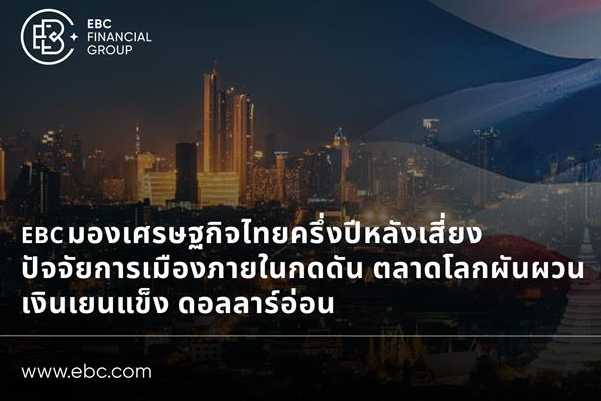EBC Financial Group ประเมินภาพเศรษฐกิจไทยครึ่งปีหลังยังคงมีความเปราะบางจากหลายปัจจัย ทั้งการเมืองภายในประเทศ ภาคการท่องเที่ยวที่ยังไม่ฟื้นเต็มที่ สงครามการค้าโลก และแนวโน้มเศรษฐกิจหลักอย่างสหรัฐฯ จีน และญี่ปุ่นที่ยังสร้างแรงสั่นสะเทือนต่อตลาดการเงินอย่างต่อเนื่อง
เมื่อวันที่ 1 กรกฎาคมที่ผ่านมา ศาลรัฐธรรมนูญไทยมีคำสั่งให้ นางสาวแพทองธาร ชินวัตร นายกรัฐมนตรี ยุติการปฏิบัติหน้าที่ชั่วคราว จากกรณีคลิปเสียงสนทนาระหว่าง สมเด็จฮุน เซน จุดชนวนการเมืองไทยให้กลับมาร้อนแรงอีกครั้ง คำสั่งศาลที่ให้ยุติการปฏิบัติหน้าที่นั้นเกิดขึ้นในวันเดียวกับที่มีพระบรมราชโองการโปรดเกล้าฯ ครม. ชุดใหม่ “แพทองธาร 2” สะท้อนว่าการเมืองยังเป็นตัวแปรสำคัญที่ฉุดการฟื้นตัวทางเศรษฐกิจ
4 ปัจจัยกดดันเศรษฐกิจครึ่งปีหลัง
ข้อมูลของ ธนาคารแห่งประเทศไทย ยืนยันว่า เศรษฐกิจเดือนพฤษภาคมยังคงชะลอตัว โดยรายได้จากนักท่องเที่ยวต่างชาติหดตัว 7% จากเดือนก่อนหน้า จำนวนผู้เดินทางลดลง 2.9% โดยเฉพาะนักท่องเที่ยวระยะไกลที่มีกำลังใช้จ่ายสูง ขณะที่ภาคอุตสาหกรรมก็ลดกำลังการผลิตลง 0.6% จากแรงกดดันสินค้าคงคลังและการซ่อมบำรุงโรงกลั่นน้ำมัน ภาคการลงทุนและการบริโภคยังขยายตัวเพียงเล็กน้อย สะท้อนความกังวลเรื่องหนี้ครัวเรือนและนโยบายสหรัฐฯ
EBC Financial Group วิเคราะห์ว่า ปัจจัยเสี่ยงสำคัญที่ยังต้องติดตามใกล้ชิดมี 4 ประเด็นหลัก ได้แก่
– ทิศทางนโยบายการค้าของสหรัฐฯ และจีน
– ความเปราะบางของการท่องเที่ยว
– การปรับตัวของธุรกิจต่อการแข่งขันและพฤติกรรมผู้บริโภค
– ความเสี่ยงทางภูมิรัฐศาสตร์และเสถียรภาพทางการเมืองไทย
ตลาดโลกผันผวน
นอกจากปัจจัยภายในแล้ว ความผันผวนในภูมิภาคเอเชียยังรุนแรงขึ้นจากสถานการณ์ล่าสุดในญี่ปุ่นและจีน โดยค่าเงินเยนแข็งค่าขึ้นอย่างชัดเจนเมื่อ USD/JPY ร่วงลงแตะระดับ 143.50 หลังผลสำรวจ BoJ Tankan ไตรมาส 2 ของญี่ปุ่นส่งสัญญาณเชิงบวกเหนือคาดเล็กน้อย สะท้อนความเชื่อมั่นธุรกิจภาคการผลิตที่ฟื้นตัว ขณะที่ Manufacturing PMI เดือนมิถุนายนของญี่ปุ่นกลับมาสูงกว่า 50 เป็นครั้งแรกในรอบ 13 เดือน แม้ภาพรวมธุรกิจบริการและผู้ผลิตยังประเมินว่าภาวะเศรษฐกิจใน 3 เดือนข้างหน้าอาจอ่อนตัวลง
ขณะที่จีนเองก็มีสัญญาณฟื้นตัวในฝั่งอุตสาหกรรมเช่นกัน โดยดัชนี Caixin Manufacturing PMI เดือนมิถุนายนดีดขึ้นแตะ 50.4 จาก 48.3 เดือนก่อนหน้า ส่งสัญญาณกลับสู่โซนขยายตัว แม้คำสั่งซื้อส่งออกยังอ่อนแรงและภาคจ้างงานยังหดตัว สะท้อนว่าการเติบโตยังต้องพึ่งนโยบายกระตุ้นจากภาครัฐต่อไป
อีกด้านหนึ่ง ค่าเงินดอลลาร์สหรัฐฯ ยังคงเผชิญแรงกดดันต่อเนื่อง โดยดัชนีค่าเงินดอลลาร์ยังใกล้ระดับต่ำสุดรอบ 3 ปี หลังตลาดเชื่อว่า Fed มีแนวโน้มจะลดดอกเบี้ยภายในกันยายนนี้ ประกอบกับความกังวลต่อ “Big Beautiful Bill” ของประธานาธิบดีทรัมป์ ที่อาจเพิ่มภาระหนี้รัฐบาลสหรัฐฯ อีกกว่า 3.3 ล้านล้านดอลลาร์ในทศวรรษหน้า สร้างแรงกดดันต่อบรรยากาศลงทุนทั่วโลก
สถานการณ์นี้ส่งผลให้ค่าเงินในเอเชียหลายสกุลยังเคลื่อนไหวในกรอบจำกัด ท่ามกลางความไม่แน่นอนเรื่องสงครามการค้าใหม่ที่ทรัมป์ขู่จะกดดันญี่ปุ่นเพิ่มขึ้นด้วยมาตรการภาษีข้าว และยังไม่มีข้อสรุปชัดเจนก่อนกำหนดเส้นตายวันที่ 9 กรกฎาคมนี้
สำหรับประเทศไทย แม้เงินบาทยังแข็งค่าตามภูมิภาค ล่าสุดอยู่ที่ 32.63 บาทต่อดอลลาร์ ขณะที่เงินเฟ้อยังอยู่ในกรอบควบคุม แต่ภาพรวมเศรษฐกิจยังคงเปราะบาง โดย GDP อาจขยายตัวได้เพียง 1.5–1.7% ตามการประเมินของหลายสำนักวิจัย หากการเมืองภายในยืดเยื้อ และแรงส่งจากการท่องเที่ยว-การส่งออกแผ่วลง
EBC Financial Group จึงแนะนำนักลงทุนและภาคธุรกิจไทยให้จับตาปัจจัยความเสี่ยงทั้งในและต่างประเทศอย่างใกล้ชิด บริหารพอร์ตลงทุนอย่างระมัดระวัง และติดตามพัฒนาการด้านนโยบายการค้า สงครามภาษี รวมถึงทิศทางดอกเบี้ยของ Fed ที่ยังเป็นตัวแปรสำคัญต่อทิศทางค่าเงินและตลาดการเงินโลกในช่วงครึ่งปีหลังนี้
EBC sees Thai economy at risk in second half of year, pressure from domestic political factors, global market volatility, strong yen, weak dollar
Advice to keep an eye on politics – trade war, financial world in turmoil, strong yen, weak dollar, investors must plan their portfolios carefully.
June 1, 2025 EBC Financial Group assesses that the Thai economy in the second half of the year will remain fragile due to several factors, including domestic politics, the tourism sector that has not fully recovered, the global trade war, and the trends of major economies such as the United States, China, and Japan that continue to create shocks to the financial market.
On July 1, the Thai Constitutional Court ordered Prime Minister Paetongtarn Shinawatra to temporarily cease performing her duties, following the audio clip of a conversation between Samdech Hun Sen, which reignited Thai politics. The court order to cease performing her duties came on the same day that a royal command was issued to approve the new cabinet. “Paetongtarn 2” reflects that politics is still a key variable holding back economic recovery.
4 factors pressuring the economy in the second half of the year
Data from the Bank of Thailand confirmed that the economy continued to slow in May, with revenue from foreign tourists contracting by 7% from the previous month. The number of travelers fell by 2.9%, especially from high-spending long-haul tourists, while the industrial sector cut production by 0.6% due to inventory pressures and refinery maintenance. Investment and consumption expanded only slightly, reflecting concerns about household debt and US policy.
EBC Financial Group analyzed that there are 4 main key risk factors that still need to be closely monitored :
– US and China trade policy directions
– The fragility of tourism
– Business adaptation to competition and consumer behavior
– Geopolitical risks and political stability in Thailand
Global markets are volatile
In addition to internal factors, volatility in the Asian region has been exacerbated by the latest situations in Japan and China, with the yen strengthening significantly as USD/JPY fell to 143.50 after Japan’s second- quarter BoJ Tankan survey sent slightly more positive signals than expected, reflecting recovering confidence in the manufacturing sector, while Japan’s June Manufacturing PMI returned above 50 for the first time in 13 months, although the overall service and manufacturing businesses still assess that the economy may weaken in the next 3 months.
Meanwhile, China itself has also shown signs of recovery in the industrial sector, with the Caixin Manufacturing PMI for June rising to 50.4 from 48.3 the previous month, signaling a return to expansion, although export orders remain weak and employment continues to contract, indicating that growth will continue to rely on government stimulus policies.
On the other hand, the US dollar continues to face pressure, with the dollar index still near a three- year low after the market believes that the Fed is likely to cut interest rates by September, coupled with concerns over President Trump’s “Big Beautiful Bill”, which could increase the US government’s debt burden by another $ 3.3 trillion over the next decade, putting pressure on the global investment climate.
This situation has caused many Asian currencies to move in a limited range amid uncertainty over a new trade war where Trump threatened to pressure Japan with more rice tariffs and no clear conclusion before the July 9 deadline.
For Thailand, although the baht is still strengthening in line with the region, most recently at 32.63 baht per dollar, while inflation is still within control, the overall economy is still fragile, with GDP expanding by only 1.5–1.7% according to estimates from many research institutes if domestic politics drag on and momentum from tourism and exports weakens.
EBC Financial Group therefore recommends that Thai investors and businesses closely monitor both domestic and international risk factors, manage their investment portfolios carefully, and monitor developments in trade policy, the tax war, and the Fed ‘s interest rate direction, which are still important variables affecting the direction of currencies and global financial markets in the second half of this year.





